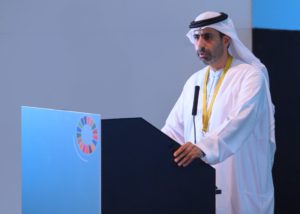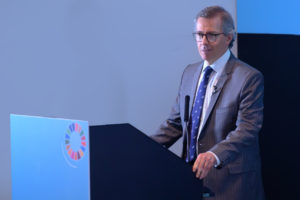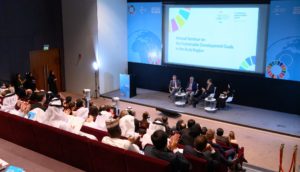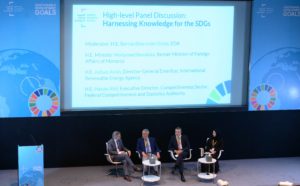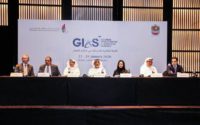New Study Calls For Cooperation Mmong Arab Countries To ‘Leave No-One Behind’ In Sustainable Development
The Emirates Diplomatic Academy (EDA) and the UN Sustainable Development Solutions Network (SDSN) today launched the first ‘Arab Region SDG Index and Dashboards Report’ during a high-level event in Abu Dhabi. Despite progress in many areas, the study highlights major challenges faced by many Arab countries in achieving the 17 globally-agreed goals for sustainable development by 2030.
The Annual Seminar on the Sustainable Development Goals (SDGs) in the Arab Region, organised by EDA, brought together more than 200 sustainable development knowledge stakeholders, and included a presentation on the findings of the report as well as a high-level panel discussion on ‘Harnessing Knowledge for the SDGs.’
Delivering a keynote speech, His Excellency Sultan Mohammed Al Shamsi, Assistant Minister at the Ministry of Foreign Affairs and International Cooperation (MoFAIC), highlighted the UAE’s monumental contribution to supporting SDG implementation in the Arab region.
His Excellency Bernardino León, Director General of EDA, said: “We are pleased to partner with SDSN, as well as stakeholders at home and abroad, in delivering policy-oriented and actionable research for the region. The Arab Region SDG Index and Dashboards Report is our first step on this road, and we hope it will help promote debate and action on sustainable development across the Arab countries.”
He announced that in line with its mission to help promote Arab leadership in the global effort to achieve the SDGs, the SDG Centre of Excellence for the Arab Region (SDGCAR) at the EDA will provide Arabic translation support for seven massive open online courses (MOOCs), produced by the SDSN’s SDG Academy.
His Excellency added: “With e-learning opening up new possibilities for education and training on the SDGs, we place great emphasis on supporting regional access to this resource developed by SDSN and its partners – both through translating existing courses and through creating new content that is region-specific and furthers the understanding of the role of diplomacy in sustainable development.”
The Arab Region SDG Index and Dashboards Report is intended to serve as a tool for governments and other stakeholders to measure progress on the SDGs and identify gaps in both implementation and data. The 2019 Arab Region SDG Index is the first in its kind and is also intended as a conversation-opener about priority areas, policies and actions.
Director of SDSN, Professor Jeffrey Sachs noted: “I am delighted and encouraged to see the 2019 SDG Index and Dashboards Report for the Arab Region. The region faces many significant challenges, with some countries caught in extreme poverty and conflict, and most facing the difficult challenges of water stress and air pollution. With the world’s largest reserves of oil and gas, the region also needs to deal with the massive challenge of the global transition to renewable energy. This report, and the SDGs, provide important tools for the Arab Region to forge societies of shared prosperity and environmental sustainability.”
The Index, which has been jointly developed by experts of SDGCAR of the EDA and the SDSN Secretariat, comprises 105 indicators, each of which has an assigned score (0–100) and a traffic light colour (green, yellow, orange, or red), to indicate performance. In addition, arrows indicate trends in progress towards achieving the goals.
The 2019 report finds that the Arab region displays a wide range of sustainable development outcomes, reflecting these countries’ significant differences in performance on many socio-economic indicators. Among the most pressing challenges for all countries in the region are sustainable food production systems and gender equality.
Based on the report, in 2019, five countries emerge as regional leaders, with a total Index score of 65 or above. In descending order, these countries are Algeria, the UAE, Morocco, Tunisia and Jordan. Several countries are on track to achieving goals related to clean water and sanitation, as well as climate action, and there are moderate increases in performance across several SDGs.
Meanwhile, Arab countries suffering from poverty and conflict, in turn, remain far from achieving the SDGs, the report finds. These countries will require tremendous efforts, both domestically and by their regional and international partners, to ensure they are not left behind.
In the report, Arab countries receive an average Index score of 58 out of 100. With only a decade left to achieve the 2030 Agenda and its SDGs, the region needs to accelerate efforts in all areas of sustainable development. This includes data necessary to measure performance, particularly relating to income and wealth distribution.
To download the full report, data and view the interactive dashboard, please visit https://eda.ac.ae/special-initiatives/sdgcar/sdgindex.
